Amazing thing happened this past week: the Iraqi government appears to have actually represented one of the main 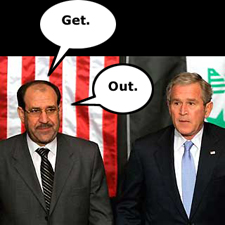 concerns of the nation it purports to represent – namely that the occupying army of the United States start making definite plans for withdrawal… that is, total withdrawal from their country. One spokesperson for al-Maliki actually talked about a timetable for pulling out. Now, this is the government the Bush administration is so very adamant about protecting. The mere mention of a timetable on this side of the ocean is an invitation to be denounced as a “surrender monkey”. Those who’ve advanced the idea are roundly accused of undermining the Baghdad government, whose stability has been bought by the blood of our soldiers, etc. And yet, this is the opinion of the vast majority of Iraqis, so it’s little wonder Maliki would bring it up a) while status of forces agreement talks are going on, and b) when there are elections coming up. Maliki’s party has a slight problem with being seen as an indigenous political movement (i.e. Dawa and SCIRI were exile parties, SCIRI formed in Iran with help from the dreaded Revolutionary Guard). This is their version of a gas tax holiday, I suppose.
concerns of the nation it purports to represent – namely that the occupying army of the United States start making definite plans for withdrawal… that is, total withdrawal from their country. One spokesperson for al-Maliki actually talked about a timetable for pulling out. Now, this is the government the Bush administration is so very adamant about protecting. The mere mention of a timetable on this side of the ocean is an invitation to be denounced as a “surrender monkey”. Those who’ve advanced the idea are roundly accused of undermining the Baghdad government, whose stability has been bought by the blood of our soldiers, etc. And yet, this is the opinion of the vast majority of Iraqis, so it’s little wonder Maliki would bring it up a) while status of forces agreement talks are going on, and b) when there are elections coming up. Maliki’s party has a slight problem with being seen as an indigenous political movement (i.e. Dawa and SCIRI were exile parties, SCIRI formed in Iran with help from the dreaded Revolutionary Guard). This is their version of a gas tax holiday, I suppose.
Either way, it seems we’ve been asked to leave. That can only mean one thing, if history is any guide: time for a new Iraqi government. This issue is a bit more complicated than it used to be, of course. Even though there are some paleolithic imperialists in the Bush orbit, I doubt they have the bottle to pull an outright coup d’etat, like we used to in the good old bad old days. Iran’s Mossadeq, Guatemala’s Arbenz, Chile’s Allende… even a longtime asset like South Vietnam’s Diem was dispatched with little thought to what would follow. In Vietnam, it was one desperate general after another, until they settled on the reliably fanatical Nguyen Van Thieu, who seemed more than content to preside over the utter destruction of his country under relentless and unprecedented American firepower. His predecessors were ejected most often because they were caught seeking some kind of rapprochement with the NLF. Not what Washington wanted then… or wants now.
Different war, different time, right? True enough. But the principle still applies. Suppose for a moment everything goes swimmingly in Iraq, from the Iraqi perspective. 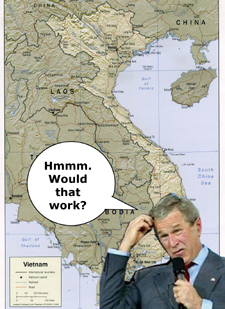 Suppose there’s a serious and deep reconciliation among the various sectarian and ethnic groupings, and that they all agree on one thing – that they want us to go home. Would we leave? I doubt it. As I’ve said here before, we didn’t invade Iraq to leave it; we came to stay, maybe as long as 100 years, as McCain suggested. (The oil would certainly be tapped out by then.) The administration and its allies have become very frank about wanting a military presence there to secure access to the second largest oil reserves in the world (and among the most profitable, as well). We’re building permanent bases and trying to push a status of forces agreement on a nation we basically destroyed over the course of the last 18 years. In the current atmosphere of rising gas prices, I’m sure our politicians believe that Americans will tolerate such a long-term commitment if they believe affordable gas may be a result. That remains to be seen… but will Iraqis tolerate it?
Suppose there’s a serious and deep reconciliation among the various sectarian and ethnic groupings, and that they all agree on one thing – that they want us to go home. Would we leave? I doubt it. As I’ve said here before, we didn’t invade Iraq to leave it; we came to stay, maybe as long as 100 years, as McCain suggested. (The oil would certainly be tapped out by then.) The administration and its allies have become very frank about wanting a military presence there to secure access to the second largest oil reserves in the world (and among the most profitable, as well). We’re building permanent bases and trying to push a status of forces agreement on a nation we basically destroyed over the course of the last 18 years. In the current atmosphere of rising gas prices, I’m sure our politicians believe that Americans will tolerate such a long-term commitment if they believe affordable gas may be a result. That remains to be seen… but will Iraqis tolerate it?
My guess is no. And though this hasn’t been an ultimatum, we may well be feeling that door hitting us in the ass quite soon.
luv u,
jp

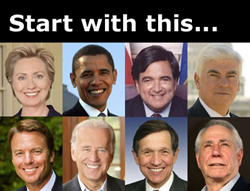 think some of the stuff he’s saying now is more like where he’s been politically since walking onto the national stage four years ago. In spite of a lot of the hype about a liberal voting record, the O-Man is no George McGovern (sadly). He’s been hugely cautious since becoming a U.S. Senator, and whereas he has the rhetorical gifts to advance progressive positions (particularly ones – like universal health care – that tend to be popular to begin with), he doesn’t have those issues deep in his gut. I think this is a textbook case of political relativity. Here’s how it works: At the beginning of the election cycle, when there are eight or more members of your party contending for the nomination, there’s a fair chance that one of them is going to be somewhere close to your way of thinking. So you might back that person, and if s/he fails to make the first cut, you might look at the remaining contenders for the next best thing. Like… starting with Kucinich and moving to Edwards, because he seems closer to Kucinich than any of the other remaining Dems.
think some of the stuff he’s saying now is more like where he’s been politically since walking onto the national stage four years ago. In spite of a lot of the hype about a liberal voting record, the O-Man is no George McGovern (sadly). He’s been hugely cautious since becoming a U.S. Senator, and whereas he has the rhetorical gifts to advance progressive positions (particularly ones – like universal health care – that tend to be popular to begin with), he doesn’t have those issues deep in his gut. I think this is a textbook case of political relativity. Here’s how it works: At the beginning of the election cycle, when there are eight or more members of your party contending for the nomination, there’s a fair chance that one of them is going to be somewhere close to your way of thinking. So you might back that person, and if s/he fails to make the first cut, you might look at the remaining contenders for the next best thing. Like… starting with Kucinich and moving to Edwards, because he seems closer to Kucinich than any of the other remaining Dems. So… you end up with this candidate who’s an amalgamation of all these other candidates – like someone added them all up and figured the average. As it happens, that ends up being somewhere around where Obama lives politically. What happens next? What the hell am I, Kreskin? Well…. here’s my guess (since I asked). Obama will play the muddle in the middle for the next few weeks. Then he’ll do something like what Gore did in 2000 – just before the Democratic convention, he’ll deliver some firebreathing populist speeches to get the base energized, knock a good one home at the convention, and use that as his basic stump sermon for the rest of the campaign. If he’s elected (big if), he’ll go back the that middle-ing Amalgaman place before inauguration day. My guess – no guarantees.
So… you end up with this candidate who’s an amalgamation of all these other candidates – like someone added them all up and figured the average. As it happens, that ends up being somewhere around where Obama lives politically. What happens next? What the hell am I, Kreskin? Well…. here’s my guess (since I asked). Obama will play the muddle in the middle for the next few weeks. Then he’ll do something like what Gore did in 2000 – just before the Democratic convention, he’ll deliver some firebreathing populist speeches to get the base energized, knock a good one home at the convention, and use that as his basic stump sermon for the rest of the campaign. If he’s elected (big if), he’ll go back the that middle-ing Amalgaman place before inauguration day. My guess – no guarantees. more relevant a news feature than the story about astronauts voting in space that ran a few days earlier on ludicrous Morning Edition.) The McCain guy had worked for prominent Republicans before, of course – namely Trent Lott and Donald Rumsfeld. That’s right – Lott, the retrograde southern conservative politician who was so reflexively racist that he made a comment he couldn’t back away from even in the wake of the G.O.P.’s 2002 congressional electoral victory… his foreign policy adviser. And, of course, Donald Rumsfeld, undoubtedly the most disastrous Defense Secretary since Robert McNamara (middle name: Strange)… How reassuring to know that McCain is getting the same advice Rummy enjoyed. So… what did this adviser to great minds have to say about the war in Iraq? Well, the NPR interviewer (Robert Siegel) stuck to narrow issues relating to the “metrics of success”, as Rumsfeld might have put it. McCain’s man bobbed and weaved a bit, saying we can start thinking about leaving when Al Qaeda is defeated. Asked how we would know when that had happened, he told Siegel they will be defeated when they are no longer a strategic threat. What does that mean in concrete terms? Ahem.
more relevant a news feature than the story about astronauts voting in space that ran a few days earlier on ludicrous Morning Edition.) The McCain guy had worked for prominent Republicans before, of course – namely Trent Lott and Donald Rumsfeld. That’s right – Lott, the retrograde southern conservative politician who was so reflexively racist that he made a comment he couldn’t back away from even in the wake of the G.O.P.’s 2002 congressional electoral victory… his foreign policy adviser. And, of course, Donald Rumsfeld, undoubtedly the most disastrous Defense Secretary since Robert McNamara (middle name: Strange)… How reassuring to know that McCain is getting the same advice Rummy enjoyed. So… what did this adviser to great minds have to say about the war in Iraq? Well, the NPR interviewer (Robert Siegel) stuck to narrow issues relating to the “metrics of success”, as Rumsfeld might have put it. McCain’s man bobbed and weaved a bit, saying we can start thinking about leaving when Al Qaeda is defeated. Asked how we would know when that had happened, he told Siegel they will be defeated when they are no longer a strategic threat. What does that mean in concrete terms? Ahem.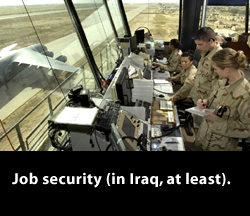 Five years into the occupation there is a strong institutional disposition toward maintaining the Iraq enterprise. While the Republicans express this in terms of continuing the current policy, in essence, the Democrats will talk about a residual force to protect the massive U.S. embassy (forbidden city, really), train Iraqi soldiers and police, and “fight terrorism” in case al Qaeda raises its profile again. That’s what the Obama camp is saying – not exactly a radical departure. This isn’t anything new, of course. The U.S. presence in Vietnam involved a substantial institutional investment that almost no American politician wanted to completely back away from. (The French colonial experience in Vietnam perhaps even more so.) So don’t think pulling the lever for the O-man is going to end this war. The war will end only when we insist upon:
Five years into the occupation there is a strong institutional disposition toward maintaining the Iraq enterprise. While the Republicans express this in terms of continuing the current policy, in essence, the Democrats will talk about a residual force to protect the massive U.S. embassy (forbidden city, really), train Iraqi soldiers and police, and “fight terrorism” in case al Qaeda raises its profile again. That’s what the Obama camp is saying – not exactly a radical departure. This isn’t anything new, of course. The U.S. presence in Vietnam involved a substantial institutional investment that almost no American politician wanted to completely back away from. (The French colonial experience in Vietnam perhaps even more so.) So don’t think pulling the lever for the O-man is going to end this war. The war will end only when we insist upon: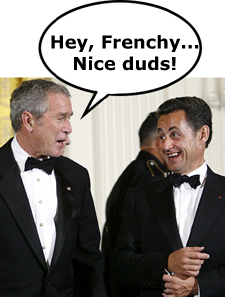 dropping in on our various European allies, mugging with the crypto-fascist Sarkozy (perhaps comparing notes on how to be slightly less unpopular than he is right now), and generally doing all he can to undermine any chance of a reduction in international tensions. He took a few ceremonial swings at the Iranian punching bag, made some thinly veiled threats against Syria, etc. Quite a performance. What a pity he has to come home so soon. Wouldn’t it be great if he just kept traveling until after inauguration day? Though I suppose it doesn’t do any harm for people to see him around the White House with some regularity, if only to serve as a grim reminder of how idiotic we were to put him there in the first place. Not that a simple trip to the gas station shouldn’t be enough to accomplish that.
dropping in on our various European allies, mugging with the crypto-fascist Sarkozy (perhaps comparing notes on how to be slightly less unpopular than he is right now), and generally doing all he can to undermine any chance of a reduction in international tensions. He took a few ceremonial swings at the Iranian punching bag, made some thinly veiled threats against Syria, etc. Quite a performance. What a pity he has to come home so soon. Wouldn’t it be great if he just kept traveling until after inauguration day? Though I suppose it doesn’t do any harm for people to see him around the White House with some regularity, if only to serve as a grim reminder of how idiotic we were to put him there in the first place. Not that a simple trip to the gas station shouldn’t be enough to accomplish that.  kind of political Irwin Allen. It’s almost as if things were just waiting for him to arrive before they started totally falling apart. (Some things, of course, took a little coaxing.) Hell, even his “success stories” are disasters. More U.S. soldiers are dying in Afghanistan, for instance, than in Iraq. And while they are portraying Iraq as quiet and safe, it is still too dangerous for any of the 4.5 million refugees to return home, as Amnesty International has pointed out. For many, there are no homes to go to. They brought about a Bosnian-style ethnic cleansing, and now that it’s over, they call it success. Except that we can’t leave… because it’s not over. Got all that?
kind of political Irwin Allen. It’s almost as if things were just waiting for him to arrive before they started totally falling apart. (Some things, of course, took a little coaxing.) Hell, even his “success stories” are disasters. More U.S. soldiers are dying in Afghanistan, for instance, than in Iraq. And while they are portraying Iraq as quiet and safe, it is still too dangerous for any of the 4.5 million refugees to return home, as Amnesty International has pointed out. For many, there are no homes to go to. They brought about a Bosnian-style ethnic cleansing, and now that it’s over, they call it success. Except that we can’t leave… because it’s not over. Got all that? not a typo nor a brain fart – Vietnam is exactly what I mean. Totally different war, of course, but the reasoning in both the public and the internal planning spheres is very much the same. It’s kind of instructive to look back at how that war was sold to us – swap a few nouns around and you’ve got the Iraq narrative, post 2003. Interestingly enough, opportunity presented itself this past week in the shape of various remembrances of Robert Kennedy on the 40th anniversary of his assassination. Amy Goodman played a tape of a talk RFK gave at St. Lawrence University in 1966 (I believe my cousin was at that event, as it happens) in which the senator responded to a question about Vietnam with a somewhat lengthy defense of LBJ’s escalation policy, in progress at the time. His justification, in essence, was the contention that the Vietcong (NLF), Hanoi, and China were hoping that the U.S. was going to “turn and run from Vietnam” and that to pull out would be “disastrous”.
not a typo nor a brain fart – Vietnam is exactly what I mean. Totally different war, of course, but the reasoning in both the public and the internal planning spheres is very much the same. It’s kind of instructive to look back at how that war was sold to us – swap a few nouns around and you’ve got the Iraq narrative, post 2003. Interestingly enough, opportunity presented itself this past week in the shape of various remembrances of Robert Kennedy on the 40th anniversary of his assassination. Amy Goodman played a tape of a talk RFK gave at St. Lawrence University in 1966 (I believe my cousin was at that event, as it happens) in which the senator responded to a question about Vietnam with a somewhat lengthy defense of LBJ’s escalation policy, in progress at the time. His justification, in essence, was the contention that the Vietcong (NLF), Hanoi, and China were hoping that the U.S. was going to “turn and run from Vietnam” and that to pull out would be “disastrous”. RFK said a lot of things that year, some of it more principled, and you had the feeling that there was some movement in him along the lines of what the entire country was going through. Really, today, we have less of an excuse than folks did in those days – we have the experience of Vietnam to draw on, whereas this was new territory politically in the 1960s. And I suppose, for sentimental reasons, I always assumed that he would have ended that war sooner if elected, though I have very little concrete to go on in that regard. Same thing with Obama. His statements on Iraq carry a certain amount of equivocation, and it’s hard to say with any certainty that he will bring the Iraq hell-disaster to a close. One thing we can be sure of – the Status of Forces Agreement (SOFA) being foisted on Iraq as we speak reflects the actual planning goals of this war more accurately than any public statements from our fearless leaders. That document will set us up for the long term military presence the war’s authors sought from the very beginning – a goal that’s very unpopular in the U.S. and in Iraq… which is why they’re not talking about it much.
RFK said a lot of things that year, some of it more principled, and you had the feeling that there was some movement in him along the lines of what the entire country was going through. Really, today, we have less of an excuse than folks did in those days – we have the experience of Vietnam to draw on, whereas this was new territory politically in the 1960s. And I suppose, for sentimental reasons, I always assumed that he would have ended that war sooner if elected, though I have very little concrete to go on in that regard. Same thing with Obama. His statements on Iraq carry a certain amount of equivocation, and it’s hard to say with any certainty that he will bring the Iraq hell-disaster to a close. One thing we can be sure of – the Status of Forces Agreement (SOFA) being foisted on Iraq as we speak reflects the actual planning goals of this war more accurately than any public statements from our fearless leaders. That document will set us up for the long term military presence the war’s authors sought from the very beginning – a goal that’s very unpopular in the U.S. and in Iraq… which is why they’re not talking about it much. sight of my mom pulling the Kennedy bumper sticker off my bedroom door, her grave expression rendering the news superfluous. A sliver of the sticker remained on that door for some time. Nasty days indeed.
sight of my mom pulling the Kennedy bumper sticker off my bedroom door, her grave expression rendering the news superfluous. A sliver of the sticker remained on that door for some time. Nasty days indeed. We need to fix this – this tendency we have to sit on our hands while outrageous crimes are committed in our names. We need to stand up when we’re being ripped off by the pirates and speculators whose representatives currently occupy the White House and halls of Congress. Failure to do so only encourages them to continue doing the same thing. Even now they’re talking about Iran almost constantly; even now they’re blackmailing the Iraqi government into allowing permanent U.S. bases in that country. They feel confident in doing all this (and more) because, aside from a little harmless unpopularity, their crimes have cost them nothing.
We need to fix this – this tendency we have to sit on our hands while outrageous crimes are committed in our names. We need to stand up when we’re being ripped off by the pirates and speculators whose representatives currently occupy the White House and halls of Congress. Failure to do so only encourages them to continue doing the same thing. Even now they’re talking about Iran almost constantly; even now they’re blackmailing the Iraqi government into allowing permanent U.S. bases in that country. They feel confident in doing all this (and more) because, aside from a little harmless unpopularity, their crimes have cost them nothing.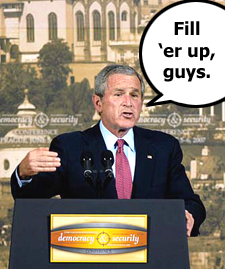 lives across the street, my sisters the next street over… in fact, none of my immediate relatives live more than 15 or 20 miles away, and they all work within spitting distance of where I live. Both of my wife’s and my vehicles, while ancient, are four-cylinder sedans, only one of which we drive with any regularity. If we clock 5,000 miles in a year’s time, that’s a lot for us, so I’m filling the tank of my ’93 Accord probably once every two weeks. A year ago, that cost around $30; now it’s $40 or so – manageable, thus far. But these precipitous price increases on gasoline are killing most people I know (and most of those I don’t know), and there appears no end in sight. It would be bad enough if it just hit you at the gas pump, but it affects everything else as well. The food you buy, the employer you work for, the community you live in – every aspect of our lives, it seems, is built on the assumption of cheap and plentiful fuel. Take that away, and our economy starts to scream.
lives across the street, my sisters the next street over… in fact, none of my immediate relatives live more than 15 or 20 miles away, and they all work within spitting distance of where I live. Both of my wife’s and my vehicles, while ancient, are four-cylinder sedans, only one of which we drive with any regularity. If we clock 5,000 miles in a year’s time, that’s a lot for us, so I’m filling the tank of my ’93 Accord probably once every two weeks. A year ago, that cost around $30; now it’s $40 or so – manageable, thus far. But these precipitous price increases on gasoline are killing most people I know (and most of those I don’t know), and there appears no end in sight. It would be bad enough if it just hit you at the gas pump, but it affects everything else as well. The food you buy, the employer you work for, the community you live in – every aspect of our lives, it seems, is built on the assumption of cheap and plentiful fuel. Take that away, and our economy starts to scream. improving fuel efficiency standards back in the late eighties and through the nineties, with horror stories about how U.S. auto manufacturers would lay off thousands of workers, etc. (an important talking point in Dan Quayle’s bizarro performance during the 1992 Vice Presidential debate). Of course, the auto manufacturers shed enormous numbers of workers anyway in the years that followed, even with fuel standards that allowed massive V-8 engines and SUV’s that look like passenger trains. Most states – including my own state, under Gov. George Pataki – allowed the speed limit to move up to 65, causing greater fuel consumption (55 mph was determined decades ago to be an optimum speed for fuel efficiency). And who can forget the current administration deploying Ari Fleischer and others to defend gas-guzzling as central to the American way of life? This is a failure of leadership, to be sure… but it is also enabled by the goofy choices we make.
improving fuel efficiency standards back in the late eighties and through the nineties, with horror stories about how U.S. auto manufacturers would lay off thousands of workers, etc. (an important talking point in Dan Quayle’s bizarro performance during the 1992 Vice Presidential debate). Of course, the auto manufacturers shed enormous numbers of workers anyway in the years that followed, even with fuel standards that allowed massive V-8 engines and SUV’s that look like passenger trains. Most states – including my own state, under Gov. George Pataki – allowed the speed limit to move up to 65, causing greater fuel consumption (55 mph was determined decades ago to be an optimum speed for fuel efficiency). And who can forget the current administration deploying Ari Fleischer and others to defend gas-guzzling as central to the American way of life? This is a failure of leadership, to be sure… but it is also enabled by the goofy choices we make. like a moth to flame, so in a sense, the Israelis gave us a gift for their birthday, by taking custody of Mr. 28% for a few precious days. Dubya was able to find people who adore him there – principally a bunch of failed politicians who wouldn’t last a week in office were it not for our massive decades-long investment in the ongoing stalemate between Israel and the Palestinians. The press dutifully played Bush’s visit as an effort to move the “peace process” forward (even as he pushed for war with Iran), but any child can see that there is no chance for a meaningful settlement under the current conditions… namely the fact that Israeli politicians have built their careers on the occupation and American politicians have built theirs, in part, on supporting and underwriting it. It is a hideous and corrosive symbiosis that those folks smiling about, whatever the people in the streets of Tel Aviv may be celebrating.
like a moth to flame, so in a sense, the Israelis gave us a gift for their birthday, by taking custody of Mr. 28% for a few precious days. Dubya was able to find people who adore him there – principally a bunch of failed politicians who wouldn’t last a week in office were it not for our massive decades-long investment in the ongoing stalemate between Israel and the Palestinians. The press dutifully played Bush’s visit as an effort to move the “peace process” forward (even as he pushed for war with Iran), but any child can see that there is no chance for a meaningful settlement under the current conditions… namely the fact that Israeli politicians have built their careers on the occupation and American politicians have built theirs, in part, on supporting and underwriting it. It is a hideous and corrosive symbiosis that those folks smiling about, whatever the people in the streets of Tel Aviv may be celebrating. First, Israel is a nation as legitimate (and as illegitimate, founded on violence and dispossession like the U.S.) as any other and, as such, has the same rights and responsibilities as any other. Second, in the territories it occupies beyond the Green Line, it has no rights, only responsibilities, as Noam Chomsky and others have frequently pointed out. This is true of any foreign occupier, so it is true of Israel. Third, the practice of meting out collective punishment and dictating terms to an occupied people is intolerable and a very serious war crime by any reasonable standard of international law, as is the continuing practice of colonizing occupied territory, which Israel has pursued for 40 years, through good times and bad. That this has been allowed to continue unchecked is no cause for celebration, in my opinion.
First, Israel is a nation as legitimate (and as illegitimate, founded on violence and dispossession like the U.S.) as any other and, as such, has the same rights and responsibilities as any other. Second, in the territories it occupies beyond the Green Line, it has no rights, only responsibilities, as Noam Chomsky and others have frequently pointed out. This is true of any foreign occupier, so it is true of Israel. Third, the practice of meting out collective punishment and dictating terms to an occupied people is intolerable and a very serious war crime by any reasonable standard of international law, as is the continuing practice of colonizing occupied territory, which Israel has pursued for 40 years, through good times and bad. That this has been allowed to continue unchecked is no cause for celebration, in my opinion. high-tech air-delivered munitions on people who live on less than a dollar a day, hitting hospitals, killing children, all by accident (of course), though how you can drop bombs on a densely populated slum and not presume that you’re going to kill innocent people is beyond my understanding. (By the standards established at Nuremberg, this doesn’t hold any water as an excuse.) We’re also dropping bombs on Somalia, the other other war – the one in which we took the side of an invader, the repressive government of Ethiopia, and played a key role in bringing Somalia back to the brink of famine and chaos. The UN and NGOs are issuing warnings about hunger in that sorry object of our attentions. They are also putting out grim advisories on Gaza, where relief programs are being stymied by the siege Israel is imposing on that territory’s citizens, cutting off fuel supplies at a time of critical need… with our full support, of course.
high-tech air-delivered munitions on people who live on less than a dollar a day, hitting hospitals, killing children, all by accident (of course), though how you can drop bombs on a densely populated slum and not presume that you’re going to kill innocent people is beyond my understanding. (By the standards established at Nuremberg, this doesn’t hold any water as an excuse.) We’re also dropping bombs on Somalia, the other other war – the one in which we took the side of an invader, the repressive government of Ethiopia, and played a key role in bringing Somalia back to the brink of famine and chaos. The UN and NGOs are issuing warnings about hunger in that sorry object of our attentions. They are also putting out grim advisories on Gaza, where relief programs are being stymied by the siege Israel is imposing on that territory’s citizens, cutting off fuel supplies at a time of critical need… with our full support, of course.  Rest assured, our president is thinking very, very deeply about the implications of this policy. (“We’re killing them,” he was recently heard to say.) He represents the worst case of senioritis I have ever seen, and I’ve seen a few. Far from “sprinting to the finish,” Bush is drifting through his last year, letting the dishes pile up in the kitchen sink, watching the lawn go to hell, and saving his dirty laundry for the trip home. Just bobbing along, not a care in the world. Let me tell you, friends – there’s going to be one hell of a party chez Bush when January 21 gets here… get your tickets now. As a warm-up, Dubya will continue to lob explosives at the neediest, building separation walls around Sadr City, and sending his legions into that sprawling slum that is home to 2.5 million – close to 10% of the total Iraqi population. No party for them.
Rest assured, our president is thinking very, very deeply about the implications of this policy. (“We’re killing them,” he was recently heard to say.) He represents the worst case of senioritis I have ever seen, and I’ve seen a few. Far from “sprinting to the finish,” Bush is drifting through his last year, letting the dishes pile up in the kitchen sink, watching the lawn go to hell, and saving his dirty laundry for the trip home. Just bobbing along, not a care in the world. Let me tell you, friends – there’s going to be one hell of a party chez Bush when January 21 gets here… get your tickets now. As a warm-up, Dubya will continue to lob explosives at the neediest, building separation walls around Sadr City, and sending his legions into that sprawling slum that is home to 2.5 million – close to 10% of the total Iraqi population. No party for them. course). This campaign is beyond inane – too insipid to even qualify as absurd. Does anyone really, really, really care about what Barack Obama’s former preacher thinks? Is Wright running for president? Is anyone taking a microscope to the sermons and unrelated public statements of any other politician’s spiritual mentors, friends, associates, neighbors, etc.? Has anyone, for instance, taken a close look at Franklin Graham, who offered prayer at Bush’s inauguration and lectured us all on being squeamish about the use of nuclear weapons? No controversy there. And if Obama’s time on a board with Bill Ayers is fair game, why not Hillary’s time on the board of Wal-Mart? After all, Bill Ayers just talked about demolishing things – Wal-Mart has demolished hundreds of small town shopping districts and driven virtual slave labor in the countries that produce the garbage they sell. Is that all good?
course). This campaign is beyond inane – too insipid to even qualify as absurd. Does anyone really, really, really care about what Barack Obama’s former preacher thinks? Is Wright running for president? Is anyone taking a microscope to the sermons and unrelated public statements of any other politician’s spiritual mentors, friends, associates, neighbors, etc.? Has anyone, for instance, taken a close look at Franklin Graham, who offered prayer at Bush’s inauguration and lectured us all on being squeamish about the use of nuclear weapons? No controversy there. And if Obama’s time on a board with Bill Ayers is fair game, why not Hillary’s time on the board of Wal-Mart? After all, Bill Ayers just talked about demolishing things – Wal-Mart has demolished hundreds of small town shopping districts and driven virtual slave labor in the countries that produce the garbage they sell. Is that all good? like McCain (pictured here in front of an American flag, by pure coincidence). Clinton’s take on it is a bit more ludicrous, because she is playing it as a working man vs. Big Oil issue – i.e. we’re going to make the oil companies pay the tax all summer, via a windfall profits tax. My ass. Anyone who thinks that that piece of legislation would pass through congress and be signed into law by Mr. 28 Percent before the annual weekend at Myrtle Beach is seriously on crack. Far more likely is that the tax would be dropped and then never added back again (lest Congress members, facing election, be accused of “raising taxes”). I haven’t heard this mentioned more than maybe once since this issue was raised, but the gas tax is a feeble attempt at addressing the actual cost of our car-based economy, with the revenue going to maintaining and repairing highways and bridges. This infrastructure is falling apart now, even with the revenue – without it, the neglect will be considerably worse. And with oil prices steadily climbing, the slight price reduction at the pump will disappear in a matter of weeks, particularly with the summer driving season kicking in.
like McCain (pictured here in front of an American flag, by pure coincidence). Clinton’s take on it is a bit more ludicrous, because she is playing it as a working man vs. Big Oil issue – i.e. we’re going to make the oil companies pay the tax all summer, via a windfall profits tax. My ass. Anyone who thinks that that piece of legislation would pass through congress and be signed into law by Mr. 28 Percent before the annual weekend at Myrtle Beach is seriously on crack. Far more likely is that the tax would be dropped and then never added back again (lest Congress members, facing election, be accused of “raising taxes”). I haven’t heard this mentioned more than maybe once since this issue was raised, but the gas tax is a feeble attempt at addressing the actual cost of our car-based economy, with the revenue going to maintaining and repairing highways and bridges. This infrastructure is falling apart now, even with the revenue – without it, the neglect will be considerably worse. And with oil prices steadily climbing, the slight price reduction at the pump will disappear in a matter of weeks, particularly with the summer driving season kicking in.